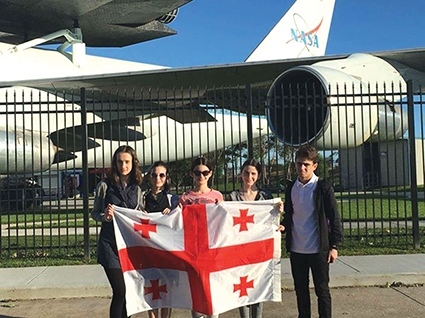Smart Kids - Winners of Millenium Innovations Award Visit NASA
The first prize winners of the Millenium Innovations Award, a team of 8th graders called Smart Kids from the Zugdidi Alexi Shushania public school- Natia Shamatava, Dea Chitaia, Aleksi Tkebuchava, Lika Kokaia and Gvantsa Chiqovani- have been sent on an educational program at the Space Center University: NASA, in Houston, US. They are the first Georgians to participate in the program.
The goal of the Millenium Innovations Award is to inspire youth to be interested in new technologies. First held in 2015, the competition is supported by the US Embassy to Georgia, with Geocell joining its supporters from 2016.
The Smart Kids’s Geological Threats project, which led to the team of five to win the Millenium Innovations Award early this year, is an early-warning system for areas at risk from potential landslides.
“Our project makes it possible to notify the population in certain areas of any possible landslide threats, in advance. The data is sent to a central server and to registered people within the territory at risk, thus giving them enough time to evacuate,” Gvantsa Chikovani, one of the team members, explained at a gathering in Geocell Hub Vake last Saturday prior to their departure to US.
“Georgia is considered a high-risk area for landslides,” said another team member, Lika Kokaia. “Samegrelo is regarded geologically as one of the most dangerous parts of the country. A flood severely damaged the road to our school in Senaki in 2016, and that was when we decided to make a device that could notify in advance about the potential threats.”
“Devices preventing landslides are usually expensive and inflexible- often not adapted to a concrete landscape,” said Smart Kids member Natia Shamatava. “Specific areas of our country need specific configurations. Construction and production of a flexible notification system in Georgia would be much cheaper and at the same time would give us a chance to cover all the critical areas in the country.”
In the Smart Kids invention, magnets are placed on the ground with censors placed several millimetres ahead and connected to a microprocessor which sends information to a central server on potential threats, through a GSM module. The information can be received via mobile application, which enables monitoring of the vibration in the ground. As soon as a set limit of vibration is noted, the mobile application sends SMS notifications to the registered population in the area. As the Smart Kids team members pointed out, their invention is cheap, adaptable to any geographical relief, is stable, provides accurate information and can be produced in Georgia.
The second prize of the Millenium Innovation Award this year went to two teams: ‘Borjgaloroveri,’ presenting the project Engine for the Moon Rover and the team ‘17’ with the project Magnetic Elevator. Members of the Borjgaloroveri team are students Giorgi Margiani and Giorgi Nioradze from New Lyceum Aia GESS, while team 17 is made up of Giorgi Pkhakadze, Oleg Jachvliani and Nino Khetsuriani from Kutaisi N17 Public School.
The third prize went to brothers Kosta and Giorgi Butbaias from Komarov Public School 199, and School-Lyceum Mtsignobartukhutsesi, for their Smart Parking project.
“We would like to thank Geocell for their support, for making these children’s dreams come true and for keeping them motivated,” said the mother of one of the Smart Kids members.
Anna Berdzenadze, a Millenium Challenge Program Coordinator who is accompanying the winners to the US, announced that the Georgian Innovation and Technology Agency is providing a 5000 GEL grant to the teams who won first, second and third places for development of their projects, while the Georgian Oil and Gas Corporation will work with the teams, assisting them in research in order to produce high quality prototypes.
Nino Gugunishvili












